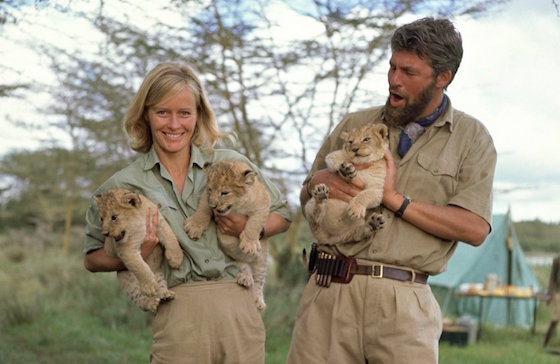Available on Dual Format Blu-Ray & DVD Man 8 May 2017
1966 was a time of Swinging London, LSD, student tumult… and the movie every family wanted to see was about a game warden and lion cubs with lashings of anthropomorphism and heartrending goo. Playing George Adamson and his wife Joy was Bill Travers and his wife Virginia McKenna. The attractive cast, gambolling wildlife, African locations and chart-topping theme tune by John Barry (sung by Matt Monro and in a ghastly muzak rendition by Roger Williams) helped make this one the biggest movie events of the 1960’s.
Modern audiences are now bombarded by wildlife TV programmes. Succumbing to Born Free with its ‘tame’ lions pretending to be wild should all look a tad phony and staged but, in truth, this is a story about humans (and human folly) as well as animals. The original audiences back in the mid-60’s were wowed by the sight of big cats filmed on location.
The Adamsons come over in the movie as enjoying an enormously privileged life in the northern province of Kenya. While Joy gets out her sketchpad George is hunting a man-eating lion (a threat to life and crops we are informed by McKenna’s cut-glass voice-over) the black servants hang up the washing. George shoots the lion and lioness and is forced to take their cubs back to camp. There is not a whit of sorrow for the dead animals but the Kleenex is at the ready when the three orphaned cubs hop out the back of the Land Rover and make their home amid the Adamson’s ethnic-knacks and rattan furniture. Ripped from the wild and their family the cubs, not unnaturally, refuse to eat until a motherly touch encourage Elsa – the weakling but the bravest of them all – to lick at Joy’s thumb.
It’s difficult not to see the leonine infants as the Adamson’s surrogate children. As the cubs grow, Elsa becomes Joy’s adorable and adored pet until the time comes when the animal is too big and a future at Rotterdam zoo beckons. Joy is distraught at the thought of her beloved Elsa held in captivity and a plan is hatched to release Elsa back into the wild although her life of constant cuddles and human companionship mitigate against her likely survival. Will she be able to fend for herself and roam the veldt? Joy is adamant that she mustn’t be caged for the rest of her life, becoming “safe but fat and stupid”. She and her husband opted for a life of independence in Africa; they can only hope for the same for Elsa.
Setting aside concerns over the status of wild animals as endangered species Born Free is a heartwarming and thoroughly enjoyable tale. The sight of the youthful Adamsons swimming with Elsa in the Indian Ocean is a joy. McKenna and Traverse helped establish the wildlife charity the Born Free Foundation. The film has its tear-jerking moments (it’s difficult not to feel a little manipulated by Barry’s symphonic score) but doesn’t shy away from the bloodier aspects of life on the game reserve.
